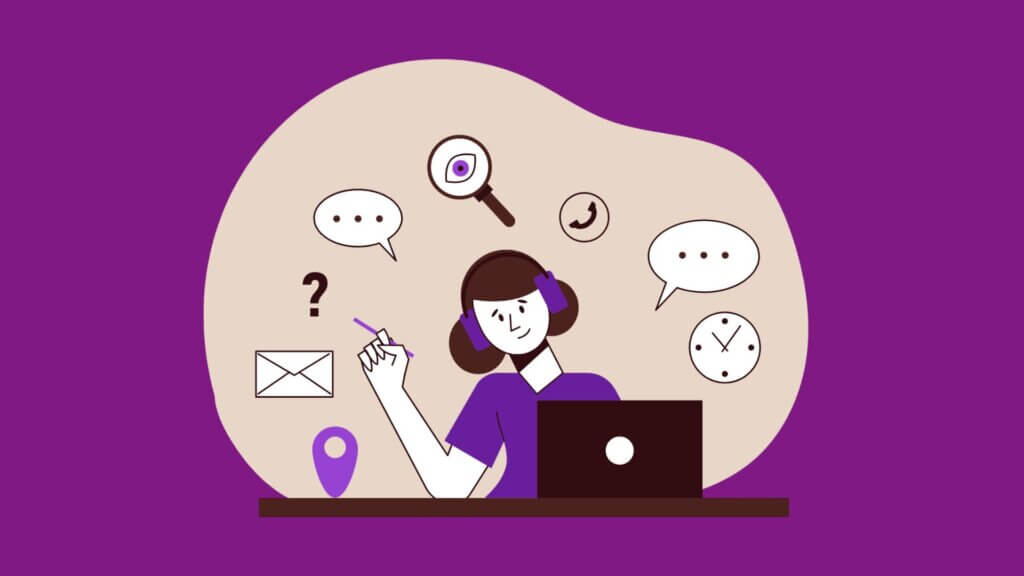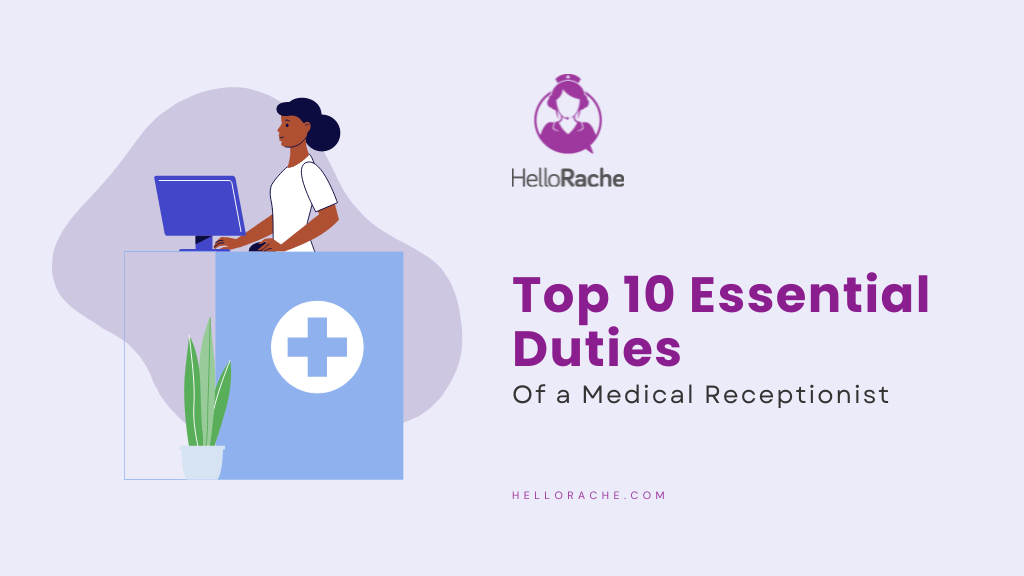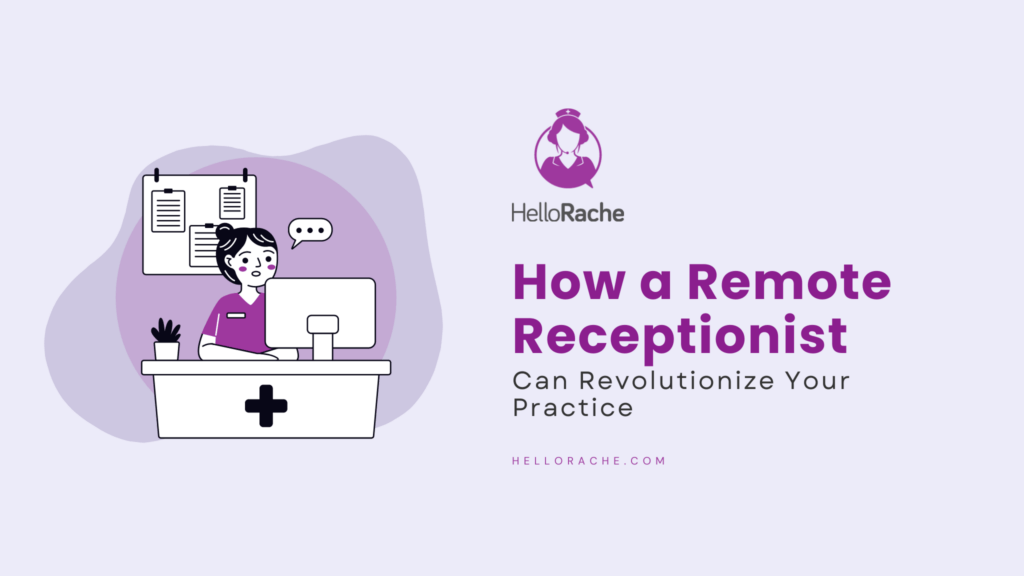The first person your clients meet and communicate with is your receptionist, and this means your receptionist needs to deliver. Now, there are certainly lots of receptionists out there, but not all receptionists are created equal. There are good receptionists and there are world-class receptionists. And these world-class receptionists are masters of customer service, a crucial element when it comes to delivering healthcare. You may think it’s difficult to secure such a talent for your team, but it’s much easier when you bring in a remote receptionist.
Unveiling the Secrets of a Remote Receptionist
You may not have worked with a remote receptionist before, but you’re not alone. The rise in importance of a remote receptionist is all down to the virtual assistant revolution, one which has resulted in exciting roles such as the healthcare virtual assistant. This revolution was fuelled by the impact of the Covid-19 pandemic and shows no sign of slowing down. But what is a virtual assistant? And how can they benefit your healthcare business?
Whether you’re working with a remote receptionist or a healthcare virtual assistant, the setup is always the same. Your remote worker doesn’t need, like your traditional in-house assistant, to attend your business premises to work. Instead, using modern, high-speed internet connections, remote workers can easily log in to your IT infrastructure and get to work. Videoconferencing and sharing large files is easily achievable on even the most basic internet connections of 2024, so this means virtual assistants can truly do it all.
So, if you decide to add a remote receptionist to your team, you’re not only taking advantage of a modern solution, but you’re also opening your business up to a world of benefits. There are few healthcare businesses who don’t want to enhance their business model, so let’s look at what these benefits are:
Cost Savings:
It’s estimated that employing a remote worker can save a business up to $11,000 per employee. These savings are made possible as there’s no need for employers to provide IT equipment, vacation pay, pension contributions, or sickness pay to remote workers employed through a VA agency.
24/7 Coverage:
A remote receptionist doesn’t need to be located in the same locality of your business. In fact. they can even be in a different time-zone. And this opens you up to a world of 24/7 coverage for your patients. It’s clear that 24/7 coverage is essential in healthcare, so working with a remote receptionist can make this a reality.
Flexibility:
A remote receptionist is available on a contract which fits the needs of your business. If you need help for three hours per day, this is possible. If you need help for two hours every other day for three weeks, it’s no problem. A remote receptionist can transition in and out of your business at a moment’s notice, so flexibility is a guarantee.
Enhanced Productivity:
Staff shortages in healthcare mean many professionals are facing burnout. This is because there simply aren’t enough hours in the day for them to focus on administrative tasks and patient care. However, you can enhance their productivity and allow them to focus on their core tasks by adding a remote receptionist. Suddenly, your healthcare professionals can delegate their admin backlog and concentrate on their patients.
Diverse Skill Sets:
All the best teams are built on a foundation of diverse skills, but it’s difficult to gather these different skill sets together when you’re limited to a local pool of employees. Luckily, working with a remote receptionist allows you to spread your net further and take advantage of global talent. This brings your business more choice and the option to work with a remote receptionist who can add different viewpoints to your team.
How Can a Remote Receptionist Help Your Business?
Integrating a remote receptionist into your business appears to be the way forwards in terms of innovation and benefits, but what are the specific tasks a remote receptionist can take on? Well, the good news is that there’s almost no limit to the duties a remote receptionist can handle. In particular, these are the responsibilities which you can trust are in safe hands:
Appointment Scheduling:
Delayed appointments and poor scheduling practices can cause anxiety for patients and lead to missed appointments. Sadly, due to the ever-growing admin burden in healthcare, effective appointment scheduling is tough to achieve. But you can remedy this with a remote receptionist. Capable of taking control of your schedule, they can arrange appointments, issue reminders, and quickly fill cancelled appointment slots.
Greeting Patients:
With a remote receptionist potentially located on the other side of the globe, it may seem impossible for them to greet patients at your business. However, thanks to videoconferencing software, a remote receptionist can now position themselves at your reception area via a screen. And with patients now more familiar with the use of video in healthcare settings, this ensures they receive a personal greeting which puts them at ease.
Email Management:
The sheer number of emails received to healthcare businesses is now so vast that doctors are considering charging for replies. But rather than levy another charge on top of your patients, why not delegate email management to a remote receptionist? Their email management skills mean they can filter out junk emails, flag urgent emails, and create categories to quickly reference what needs doing with an email. This improves the flow of emails in and out of your practice and preserves your doctors’ time.
Patient Inquiries:
With many physicians working up to 60 hours per week, it’s difficult for them to respond to every patient inquiry. Nonetheless, it’s important for your patients to receive answers, and in many cases a remote receptionist can do this with ease. They can easily advise on non-clinical matters such as chasing up test results, forwarding patient information leaflets, and assisting with billing queries. It’s an approach which both allows your patients to remain informed and reduces their anxiety.
Patient Intake:
Doctors are pushed for time in 2024, and many don’t even have time to take proper breaks. This is detrimental to not only their wellbeing, but also the service their patients receive. Thankfully, a remote receptionist can give them some time back by taking charge of the patient intake process. Recording information such as patient demographics, medical information, and current symptoms, a remote receptionist can save your physicians significant time on every appointment.
Record Management:
A remote receptionist is key to keeping digital medical records organized and up to date. They can handle everything from storing and accessing records securely in the EHR to updating them in line with health regulations. This includes making sure patient histories, test results, and treatment plans are accurate and current. By staying on top of records, they can help your healthcare business make quicker decisions and provide the best care possible.
Enhance Your Business with a Remote Receptionist
Packed full of benefits and capable of taking on any task allocated to them, a remote receptionist is the perfect solution for any healthcare business looking to push itself forwards. Patient satisfaction is the key to success for healthcare businesses in 2024, and a remote receptionist empowers you tick all the necessary boxes to achieve this.
But where do you find these modern marvels of staffing? Well, you don’t have to look far, as Hello Rache can easily find you a remote receptionist or a healthcare virtual assistant. Having been involved in the virtual assistant industry for many years, we know how to find the very best virtual assistants and connect them with the right clients for a perfect fit. Best of all, you can take advantage of the power of a remote receptionist or healthcare virtual assistant for $9.50 per hour, with no setup or contact fees.
So, if you’re ready to bring in a remote receptionist and transform the power and efficiency of your healthcare business, just click here to get started on finding out more.




